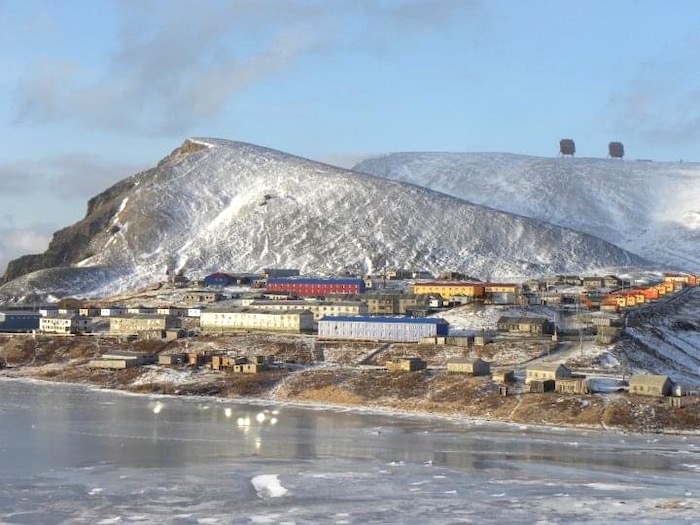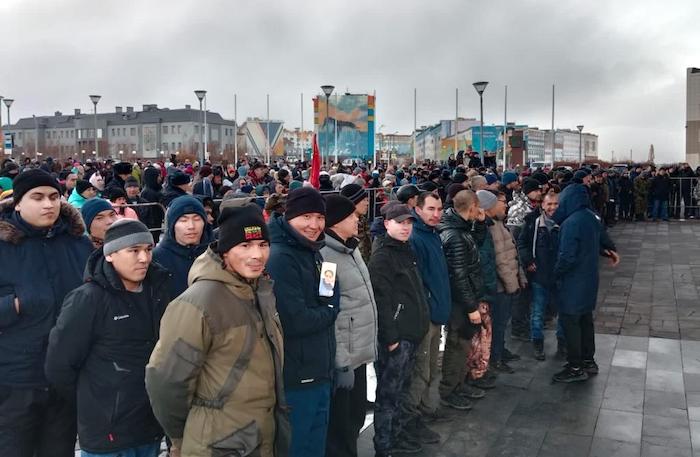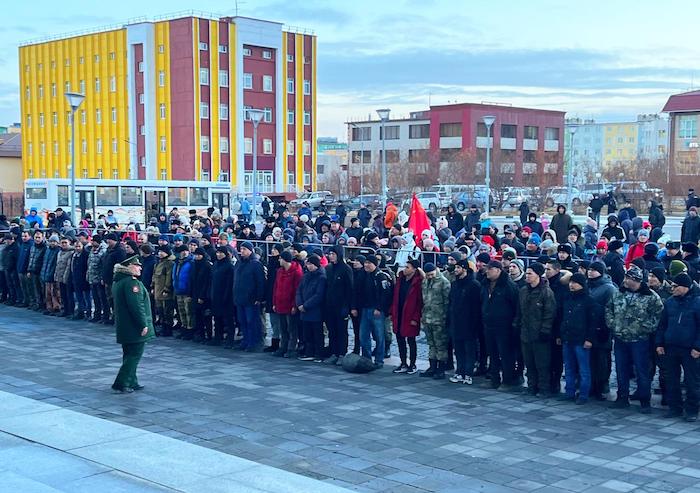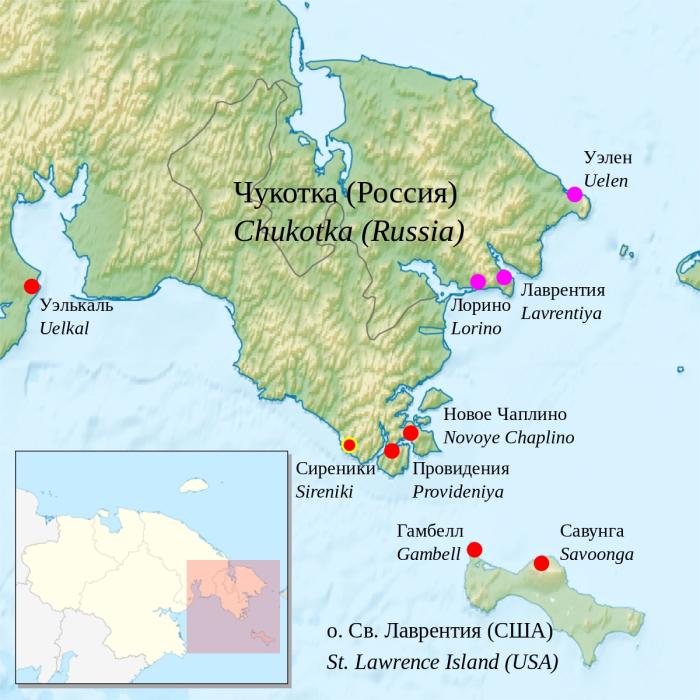By: Luda Kinok, Sighineghmiit Immigrant to Alaska
My name is Luda Kinok. I was born in 1977 in Sireniki village, (Sighineq in Yupik) on the southeast coast of Chukotka. The USSR was at the height of the Cold War by the time of my birth. I am named after my grandfather, Kinguk, and my grandmother's father, Illutaq.
There are four main Yupik groups in Chukotka, Russia—Ungazighmiit, Nuvuqaghmiit, Sighineghmiit, and Avatmiit—with several other smaller tribal groups. Each have their own distinct language, culture, and ancient ancestral territory. The Yupik are the only ethnic group in Russia related by blood to people in Alaska.
Note: The map in Figure 1 is sourced from Central Siberian Yupik Language.
For us, Yupiget (plural), the Cold War started when a Soviet Airborne regiment base was established in the Yupik territory of Avan—under the leadership of the war hero, Rokossovsky (1947–1952). In response, the US closed the border in 1948 with the message that US national security interests outweighed the interests of the local people. As a result, the International Date Line split my Yupik people in half, separating relatives on both sides of the Bering Strait without any communication for the next four decades.
It wasn't the first time the Soviets used Yupik to define their military, economic, and political controls and gain more territory. In 1926, during a territorial dispute over Wrangell Island in the northern Chukchi Sea, the Soviets used 55 Yupik from Avan and Ungaziq—relocating them in order to create a colony and establish a firm boundary on the island.
In his first days as USSR leader, Nikita Khrushchev realized how close Chukotka was to Alaska—a territory of capitalistic America. In complete secret, a massive government presence transformed Yupik land into a key nuclear site in the USSR in the late 1950s. Since then, right on the ancient Yupik settlements, the authorities have built dugouts, barracks, and bomb shelters, among other structures. The highest points of the slopes became anti-aircraft batteries, and the narrow coastal lines became artillery fields. Hidden tanks surrounded Avan. Such a high number of military installations called for highly qualified personnel. The 1910 census in Avan counted 80 Yupik, and by the 1980s, old Avan territories, Provideniya and Ureliki, totaled 8,000 newcomers.

The Soviet government began a covert operation to forcibly relocate Yupik in the summer of 1958. Out of 1,100 Yupik from the largest villages of Nuvuqaq, Ungaziq, and Avan, 800 had to abandon their homes. The Naukan and Avan exiles scattered across Chukotka. Ungazighmiit were fortunate to be moved to a brand-new village of New Chaplino. However, aboriginal hunting was impossible in this Soviet-style reservation. Yupik called the local Tkachen Bay "dead." The former Ungazighmiit became even more dependent on the Soviet government for their daily needs because a village is linked to regional center Provideniya. Sireniki was the only Yupik village that escaped relocation, so some exiles settled there. Historically, because of the linguistic barrier, Yupik rarely married Sighineghmiit. It was inevitable that one of the Native tongues would die out. In 1997, the last speaker of my ancient language died. Russian census declared the Sighimighmiit language extinct.
Soon, integrated Sireniki reflected USSR and developed into its microcosm of a complex society. The Russians' dominance and superiority over that vacuumed world were unquestionable, and it remains so today. Udarnik, Sireniki's collective farm, grew in size and strength. Following confiscation of reindeer herds from the nomadic Chukchi, the government expanded the herds in the area. Udarnik hired former owners as reindeer herders and forced them to move to a foreign coastal Yupik village. Traditionally, both Yupik and Chukchi specialized in trapping for winter clothing. Coastal people rendered marine mammal fat for food and for oil lamps. The Soviets commercialized these cultural practices for profit. Collective farms sold oil for manufacturing products in the mainland and exported fur to far larger markets. A weird fusion of Soviet tactics and Arctic traditions developed into a new life cycle, employing the newly migrated residents from closed Native settlements. Stuck between two worlds, where dominated culture dictated its own concept of good and bad, hybrids merged, no longer traditional Yupik and never a true Russian. We have learned to adapt and survive.
Another political phase followed the fall of the USSR. Nuclear peace thawed a Cold War but backfired on the Chukotka people. The Government transported nuclear weapons from our region in 1986. A biblical-scale exodus of all qualified personnel followed. People fled the Soviet Arctic as they ran from concentration camps. It resulted in immediate and total paralysis. People did not see paychecks or pensions for months at a time. Even during brutal Arctic winters, we suffered without any electricity or heat. Navigation stopped in 1999–2001, causing severe hunger. Infectious diseases like measles and dysentery were accompanied by starvation. Neither the authorities nor the general public acknowledges it happened. Only boil marks on my body remain as silent testimony to this recent past.

Each generation of Yupik faced their own share of adversities. It is our turn to live. There are 422 people in New Chaplino, Chukotka, 209 of them are men. About 20 villagers "volunteered" to fight in a war in Ukraine. This number gives some idea of the overall proportions of the mobilization that took place in the country—10% of the entire male population of New Chaplino were drafted in the first wave. Native men in Chukotka are still receiving notices as a continuous mobilization. Assuming that these calculations are estimates, the draft in New Chaplino reflects how Indigenous peoples of Russia being disproportionality mobilized. It is a huge tragedy for ethnic minorities, especially for Yupik, who are only 1,654 people.

I requested asylum in 2014 and was granted it. However, Russian authorities are continuing to persecute us. On 3 April 2023, a Federal Security Service (FSB; formerly the KGB) officer came to my family's home in Sireniki to question about me and my writings. They have threatened my family to keep me from writing about the war in Ukraine or anything anti-Russian. To put a stop to booming industry, the world came together to save whales in the last century. Today, climate change has drawn attention to our land. While the world counts polar bears, our Yupik numbers are dropping just as quickly. We are easy to attack and can't defend ourselves. Our voices are just as inaudible on surface as whales'. I am hoping to raise awareness of the real people—the Yupiget. We deserve to live and be.
About the Author
 Luda Kinok shares that she grew up in a Yupik village that had undergone Sovietization. In 1994 at 16, she became a minister and served as a missionary in the Provideniya region until 2004. “Since western Christianity is considered a "foreign agent" in Russia, the authorities have noticed my religious practice.” After receiving an invitation from the Christian radio station in Nome, Alaska, to serve as a volunteer director of Russian programming, Luda visited Nome in August of 2004, thanks to a visa-free travel program. There she discovered that the Yupik language and culture are still being spoken and practiced today and rediscovered her heritage and connections to her people. She lived in Nome intermittently for eight years, then returned to Russia to work as a missionary. “This time, the FSB was watching me more closely. I stayed home for two years until officials questioned 38 of my friends and family members.” Luda returned to Nome, Alaska and sought refuge in 2014. After obtaining permanent status, she filed for a US Postal Service job in 2018. Luda moved to Honolulu, Hawai'i in 2021. She writes, “Since moving to Alaska, I've been fascinated with my Yupik lineage and have been researching it to reconnect with my roots.”
Luda Kinok shares that she grew up in a Yupik village that had undergone Sovietization. In 1994 at 16, she became a minister and served as a missionary in the Provideniya region until 2004. “Since western Christianity is considered a "foreign agent" in Russia, the authorities have noticed my religious practice.” After receiving an invitation from the Christian radio station in Nome, Alaska, to serve as a volunteer director of Russian programming, Luda visited Nome in August of 2004, thanks to a visa-free travel program. There she discovered that the Yupik language and culture are still being spoken and practiced today and rediscovered her heritage and connections to her people. She lived in Nome intermittently for eight years, then returned to Russia to work as a missionary. “This time, the FSB was watching me more closely. I stayed home for two years until officials questioned 38 of my friends and family members.” Luda returned to Nome, Alaska and sought refuge in 2014. After obtaining permanent status, she filed for a US Postal Service job in 2018. Luda moved to Honolulu, Hawai'i in 2021. She writes, “Since moving to Alaska, I've been fascinated with my Yupik lineage and have been researching it to reconnect with my roots.”

